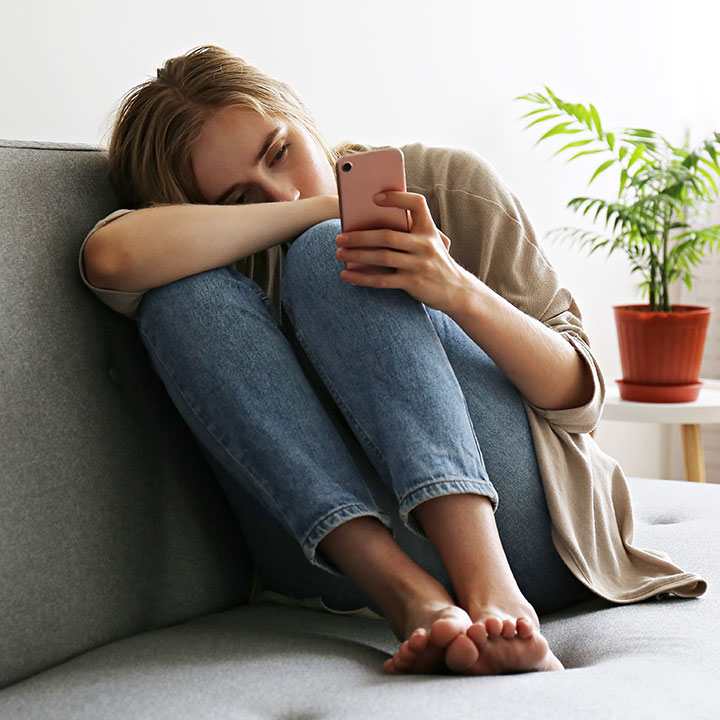In this day and age, technology seeps into nearly every aspect of our lives. You likely spend most of your day on the computer for work, and when you clock out, you may spend your evening unwinding by scrolling on your mobile device or watching tv. There’s practically no end to it–which is why technology addiction is so prevalent today. In fact, according to WebMD, research shows that around 61% of people admit they’re addicted to the internet. If you fall into this category, it could be time to limit your technology use by doing a digital detox.
To learn more about the effect of technology and how to do a digital detox to improve your overall health, we spoke to Board-Certified Psychiatrist Dr. Harold Hong, Medical Director of New Waters Recovery, Registered Psychotherapist Natasha Sandy, and Therapist Stephanie Gilbert, LMFT, BICBT-CC. Find all of their insight below to discover the best tips, tricks, and reasons to cut down on screen time and be present in your daily life.
What is a digital detox?
You’ve probably heard of some sort of detox for your body before. For example, maybe you know someone who’s tried out a juice detox to cleanse their body of toxins. A digital detox, however, doesn’t have anything to do with what you eat, but rather with the content your brain consumes–i.e., all that time you spend scrolling on a screen every day.
When you partake in a digital detox, you take control over your screen time by setting boundaries with your devices and screens in order to improve your mental health, productivity, and even personal relationships. A digital detox is an opportunity to unplug, reset, and become more present in the world around you.


Benefits of doing a digital detox
The benefits of doing a digital detox are numerous–below are just a few.
Calm down and less stress
If you find yourself frequently overloaded with stress and anxiety, you may think that spending time scrolling through social media or watching TV can solve the issue. However, as it turns out, too much technology can actually increase stress levels. One of the most important things to do in order to find a deeper sense of calm and greater mental wellbeing is to be present, Sandy explains. “The more present we are able to be in our lives, the less anxiety and depression are able to rule our lives,” she says. “It can take some practice to learn to be present, especially when trauma, anxiety, depression and other kinds of mental/emotional/spiritual distress take center stage.”
Taking time away from social media and devices in order to do other things you enjoy is a fantastic way to cultivate presence. "Moving the body is a great way to become more present and enter the here and now space, as is engaging in creative things like play or music making or music listening or doodling or coloring or hanging out with animals or writing, and so on."
Better social interactions
Although technology is meant to cultivate connections far and wide, it can actually have the opposite effect if you’re spending too much time online and not interacting with the loved ones around you. That constant connection online means nothing if you’re not connecting with the present moment. “Taking breaks from technology makes space for us to plug into the here and now and be more present in our lives, including the relationships in our lives. Relationships are the heartbeat of life and our mental health: this includes our relationship with ourselves, those around us, and our relationship with the Earth and all other beings we share it with,” Sandy tells us. Essentially, when you cut down your screen time, you can squeeze in a lot more real life “face time.”
Be more productive
Imagine how much you could get done each day if you didn’t spend 5 hours looking at photos on Instagram! “When we take breaks to be present and mindful about what we're doing, we're also more productive overall,” Gilbert confirms. When you make an effort to cut down your screen time, put your phone away, and really get down to business, you’ll be able to focus more at work or any other number of tasks you want to complete–including the hobbies you’ve been putting off because Twitter is just too enticing.
Feel better about yourself
The Internet has made it easier than ever to compare ourselves to others–and that means we typically end up feeling not-so-great about our own lives and appearances. Dr. Hong notes that excessive use of technology “can trigger feelings of envy, which can then lead to symptoms of depression.” He also points out that “this is ironic because not everything we see on social media is true. And in most cases, people only post the good parts of their lives-these are what we tend to compare our lives to.” Luckily, you can cut out any exposure that may lead to too much jealousy by spending time off of your phone and enjoying the good parts of your own life.
Sleep better
If you’re struggling to fall asleep and rest through the night, it might have something to do with the fact that you’re spending too much time in front of a screen too late in the evening.
“A good night’s sleep is important for our physical and mental health. It helps us recharge and feel refreshed for the next day,” Dr. Hong says. “But staring at screens before bed can make it harder to fall asleep. So make sure to put away all electronics for at least 30 minutes before bed. This will help you get the restful sleep you need to feel your best.”
Be healthier
When all of these aspects–like your social interactions, your sleep habits, and your mental health–improve thanks to less screen time, you’ll see an improvement in your overall wellbeing. Spending time away from technology will allow you to spend more time taking care of yourself, cooking healthy meals, getting outdoors to exercise, and just feel better all around. Your body and brain will likely thank you for it!

Here's how to do a digital detox
Ready to reap all of these benefits and get started on your digital detox? Here are a few important steps to keep in mind:
1. Determine the issue
You’ve likely heard it before about addiction: the first step is admitting you have a problem. The same goes for addiction to technology like digital devices! If you really want to commit to a digital detox, the first thing you’ll need to do is identify and determine the issue. For example, do you spend too much time watching TV? Or is the biggest culprit in your life the apps on your iPhone? It may be helpful to decide to narrow down the issue so you can tailor the detox to cut out the major issues. Committing to a social media detox, for example, may be more helpful to you than cutting out streaming services.
2. Use apps to track phone usage
When embarking on your digital detox, it’s helpful to track how much of your day is eaten up by time spent on technology. That way, you can figure out exactly how bad the issue is and make informed (and realistic) decisions on how to cut down your screen time. There are several apps out there that can help you track the minutes you spend on each app and website–iPhones, for example, have a built-in screen time tracker.
3. Create goals
After you determine the amount of time you spend on social media apps, digital devices, and watching TV, you can set some goals for yourself to lower your screen time and foster a healthier relationship with technology. For example, maybe you have a specific amount of time you want to spend on your phone each day. Dr. Hong points out that “studies show that the ideal social media use is 30 minutes a day,” and that limiting your usage to this half hour “will significantly help you improve your mental health and overall well-being.” But if that goal feels too lofty for you, it’s okay to cut back little by little. A digital detox doesn’t have to be all or nothing!
4. Set healthy limits and breaks (before bed, while eating, upon waking, etc)
After setting your goals, it’s time to put them into action by creating healthy limits and boundaries for yourself when it comes to your mobile devices and screen time. “When you think about your relationship with technology, boundaries are essential,” Gilbert tells us. “Just like any other relationship, when we don't have clear boundaries there tends to be issues. Having clear boundaries as your digital detox might look like taking a break from all technology during meals to encourage yourself to be present at the meal and enjoy what you're eating. Steps like this can decrease overall stress and encourage you to feel better overall.” It may be helpful to start by restricting your usage of social media apps while eating, while in your bedroom, or while working.
5. Turn off notifications
Even when you set limits for yourself, being bombarded with a stream of notifications from social media apps and texts on your digital device may tempt you and pull you back into a hole of endless screen time. For this reason, it’s helpful to turn off notifications throughout the day or in times that you’ve deemed technology-free. Consider using a “do not disturb” setting on your mobile devices. If you don’t want to miss out on important text messages or other notifications, you can even choose to block notifications from specific apps. Regardless, the idea is that you shouldn’t constantly be checking your phone–and if you know there are no notifications waiting for you, or if you don’t hear the pings going off, you’ll be a lot less likely to do that.
6. Leave your phone behind
Despite what you may think, you don’t actually have to take your mobile devices wherever you go! One of the best ways to stay committed to the boundaries you’ve set and reap the benefits of a digital detox is to leave your phone behind every now and then–whether it’s in another room while you work, or at home while you step out to run errands or take a quick walk.

7 Signs you might need a digital detox
1. If you're suffering from self-image problems or low self-esteem
Like we mentioned earlier, social media apps can be a major confidence killer because it allows you to constantly compare yourself to others. “Comparing ourselves with others can also create a great deal of stress for us, and technology doesn't help with that,” Clinical Psychologist Katie Moore tells us. “No matter if you are on social media or reading a blog on your favorite website, there's almost always something that we use as a comparison tool.” If you find yourself opening Instagram and other social media sites only to be bombarded with the luxurious lives, good looks, and accomplishments of others that leave you feeling negatively about yourself, it’s likely time to take a break and find contentment in your own life.
2. Having sleep problems
As mentioned above, one of the biggest benefits of a digital detox is improved sleep. Even if you’re not sure if too much screen time is the root of your sleep issues, trying a digital detox out couldn’t hurt–you may be surprised to see how much it helps your sleep to cut back your time spent on digital devices before bed.
3. Feeling obligated to consume
If you feel the constant urge to be checking your phone or to see the latest posts on Instagram, Facebook, or Twitter, that’s a good sign it’s time to take some time away from social media apps and cut down on screen time. Once you stop depending on dopamine releases you get from posting and consuming, you’ll be able to stay more focused and lead a happier, healthier life.
4. Depression or anxiety
Spending too much time on technology can make a massive impact on your mental health. From comparing yourself to others to being too plugged into the latest bad news at all times of the day, there are many reasons technology addiction can lead to issues like depression and anxiety. For this reason, committing to a digital detox can be a great idea if you find yourself suffering from a low mood or high amounts of stress and anxiety.
5. Lack of exercise
Ample exercise is integral to our overall health. If you’re finding it hard to work up the motivation to take a walk or hit the gym because you’re too consumed by watching tv or scrolling through social media apps, a digital detox just might be the solution.
6. Lack of time management
Those who find it difficult to manage their time and complete all the tasks on their to-do list in a given day could greatly benefit from a digital detox. It’s incredible how much time our digital devices can suck out of our day–but when you limit that amount of time, you’ll likely find you’re able to accomplish much more in your life, and even stay much more focused while accomplishing it.
7. Work ethic issues
Are you finding it difficult to give it your all at work? Do you find yourself constantly checking your phone while on the clock? Then it might be time for a digital detox. When you set limits and put your phone away while working, you’ll likely find that you can do a much better job, and even have more motivation to do the best work you can.
While these are just a few of the reasons you may want to embark on a digital detox journey, just about everyone has something to gain from limiting the amount of time they spend consuming technology. Whether you want to improve your focus at work, feel better about yourself and limit anxiety, or just be more present in the world around you, the benefits of a digital detox are numerous. And remember, technology use doesn’t have to be all or nothing–so it’s definitely worth a shot!


























